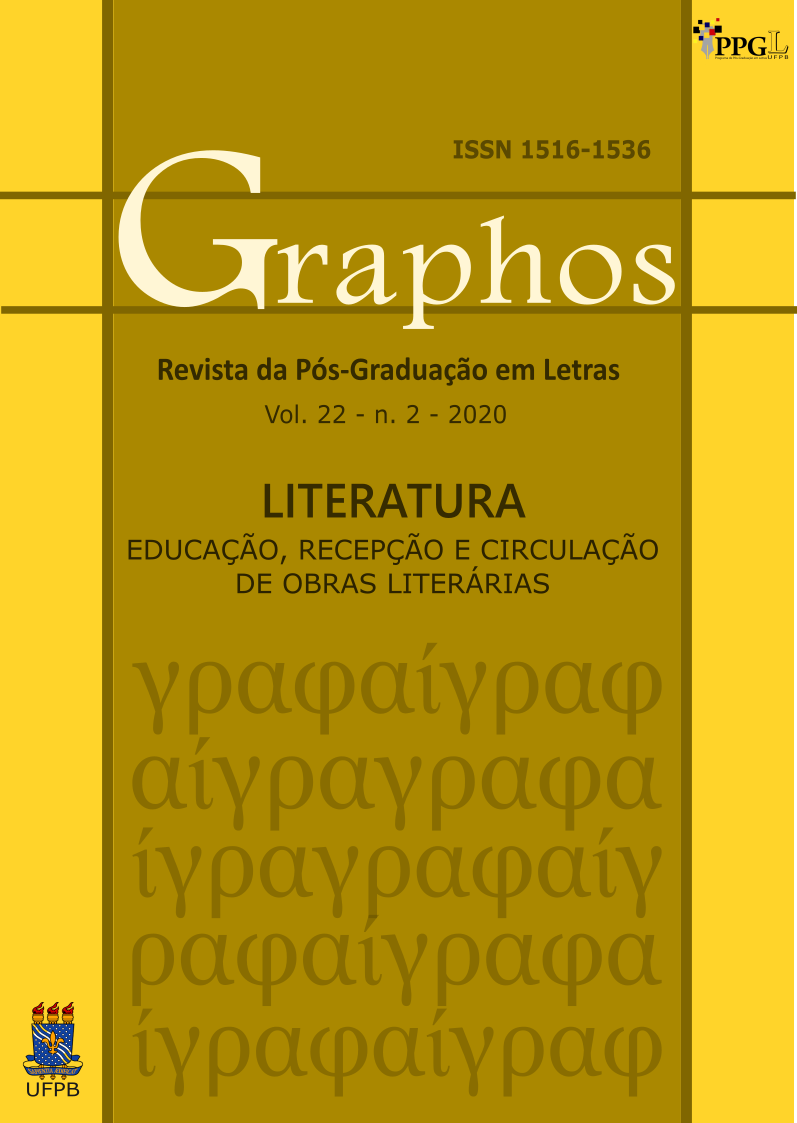Narrative, narratives and point of view: notes for an explicit teaching of literature
DOI:
https://doi.org/10.22478/ufpb.1516-1536.2020v22n2.52291Keywords:
Explicit teaching, Method, Literature, Narrative, Point of viewAbstract
This paper presents a proposal to teach literature based on explicit teaching as a way to provide more effective learning for modern foreign languages students who have difficulties in reading and writing as well as little practice in reading literary texts. Initially, the proposal is aimed at college education, but it can also be adopted at all levels. It has shown positive results for children, youth and adults, especially for those with learning difficulties, as demonstrated by recent works of Steve Bissonnette, Clermont Gauthier and other researchers. Focused on the teacher, it does not depend on great changes in school environments or any additional investments. Based on the discoveries of cognitive psychology made since the 1950s, it can be an answer to Brazilian students’ limitations in the field of reading, which were evidenced by the most recent results of the Program for International Student Assessment (Pisa), part of which is presented in this paper. The paper is divided in two parts. The first one presents a contextualization of the current situation of the teaching of literature, by tracing a brief history of Western education, as well as of the place of literature in schools since Classical Antiquity. In the second part, it presents the first stage of what a class based on explicit teaching would be like. It presents the preparation phase, with emphasis on the appropriation of the necessary content (theories of point of view), as well as a brief script of a class, which includes activities that respect learners’ working memory. As a way of developing students’ critical sense, students are encouraged to relate the class content (the short story “The house of Astérion”, by Jorge Luis Borges, and the narrative category of point of view) to the popular notion of narrative in the way it has been disseminated in social media, thus bringing the study of literature and the students' daily experience closer together.
Downloads
References
BENVENISTE, E. Problèmes de linguistique générale. I. Paris: Gallimard, 2000.
BOOTH, Wayne. A retórica da ficção. Tradução de Maria Teresa H. Guerreiro. Lisboa: Editora Arcádia, 1980.
CAMARGO, F.; DAROS, T. A sala de aula inovadora: estratégias pedagógicas para fomentar o aprendizado ativo. Porto Alegre: Penso, 2018.
CAMBI, F. História da pedagogia. Tradução de Álvaro Lorencini. São Paulo: Fundação Editora da UNESP (FEU), 1999.
CARPEAUX, O. M. História da literatura ocidental. 3. ed. Brasília: Senado Federal, Conselho Editorial, 2008. Volume I.
CARVALHO, Alfredo Leme Coelho de. Foco narrativo e fluxo da consciência: questões de teoria literária. São Paulo: Pioneira, 1981. (Manuais de estudo).
CHIAPPINI, Ligia. O foco narrativo. 3. ed. São Paulo: Editora Ática, 1987.
DAL FARRA, Maria Lúcia. O narrador ensimesmado: o foco narrativo em Vergílio Ferreira. São Paulo: Editora Ática, 1978. (Coleção Ensaios).
GAUTHIER, C. et al. Ensino explícito e desempenho dos alunos: a gestão dos aprendizados. Tradução de Stephania Matousek. Petrópolis, RJ: Vozes, 2018. Coleção Ciências Sociais da Educação. Edição Kindle, versão para PC.
GENETTE, G. Discours du récit: essai de méthode. Éditions du Seuil: Paris, 2007.
GUIRALDELLI JUNIOR, P. História da educação. 2. ed. rev. São Paulo: Cortez, 2001. Coleção Magistério – 2º Grau, Série Formação do Professor.
HAASE, V. G. et al. Por que o construtivismo não funciona. Disponível em: < http://pepsic.bvsalud.org/pdf/psipesq/v9n1/v9n1a08.pdf>. Acesso em: 03 maio 2020.
INEP. Pisa 2018 revela baixo desempenho escolar em leitura, matemática e ciências no Brasil. Disponível em: <http://portal.inep.gov.br/artigo/-/asset_publisher/B4AQV9zFY7Bv/content/pisa-2018-revela-baixo-desempenho-escolar-em-leitura-matematica-e-ciencias-no-brasil/21206>. Acesso em: 03 maio 2020.
MAGALHÃES, V. F. O “efeito” de ficção na leitura juvenil. Disponível em: <https://www.iniciativaeducacao.org/pt/ed-on/ed-on-artigos/o-efeito-de-ficcao-na-leitura-juvenil>. Acesso em: 03 maio 2020.
MOISÉS, Massaud. Dicionário de termos literários. 4. ed. São Paulo: Editora Cultrix, 1985.
MONTERO, R. La loca de la casa. Disponível em: <http://pdfhumanidades.com/sites/default/files/apuntes/La%20Loca%20De%20La%20Casa%20-%20Rosa%20Montero-FREELIBROS.pdf>. Acesso em: 03 maio 2020.
REIS, C.; LOPES, A. C. M. Dicionário de teoria da narrativa. São Paulo: Editora Átiva, 1988. Série Fundamentos.
Downloads
Published
Issue
Section
License
Copyright (c) 2020 Revista Graphos

This work is licensed under a Creative Commons Attribution 4.0 International License.







